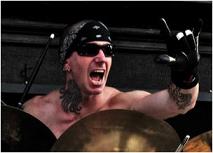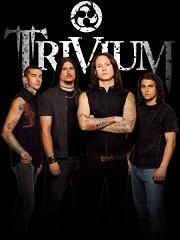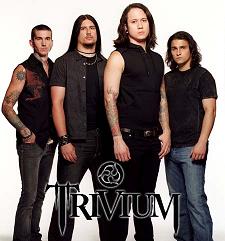Trivium’s Travis Smith
by Alissa Ordabai
Staff Writer
 In our age of mass obsession with celebrity, status and fame, it is always rare and uplifting to speak to musicians who place their craft and their art above any current superficial fixations. Trivium’s drummer Travis Smith turns out to be exactly one of those people, as he and I sit down to talk backstage at Graspop Metal Meeting – an annual heavy music festival taking place every year in the Belgian town of Dessel. Smith, more or less ignoring the mayhem and the hoopla that go with being on a world tour and playing one of Europe’s biggest summer festivals, tells me about things that really take priority in his life – his instrument, his craft, his love for making music and for performing live.
In our age of mass obsession with celebrity, status and fame, it is always rare and uplifting to speak to musicians who place their craft and their art above any current superficial fixations. Trivium’s drummer Travis Smith turns out to be exactly one of those people, as he and I sit down to talk backstage at Graspop Metal Meeting – an annual heavy music festival taking place every year in the Belgian town of Dessel. Smith, more or less ignoring the mayhem and the hoopla that go with being on a world tour and playing one of Europe’s biggest summer festivals, tells me about things that really take priority in his life – his instrument, his craft, his love for making music and for performing live.
If anything goes to backup Smith’s earnest stance, it is Trivium’s space-rocking scorcher of a set on the main stage of GMM which took place just a couple of hours before our chat. The band has proven to be the most energetic of all acts who played that day, poignantly precise and clear in their message – that metal today is more alive than ever, thriving on integrating new influences, now methods, and new genres into its formula.
The amount of sheer physical energy that Trivium put into their shows is staggering, but it all serves a bigger purpose than just brilliant showmanship and visual panache. Live, Trivium are able not only to perfectly reproduce the brilliant chops that shines on their records, but also to add that special magic quality to their material which makes it all stand out so prominently, so, if you like, three-dimensionally – the crystal-clear harmonies, the gripping melodies, and the sheer drama of their songs which are able to go from gigantic riffs set over the wall-of-fire rhythm section to sprawling, instantly memorable melodies. And with so many influences gathered from different eras, sources and styles, all this makes Trivium an incredibly exciting, multi-layered band to explore and to get into.
As it is with any growing and developing band, Trivium are perhaps fun to talk to about rockstar lifestyle and delights that go with it, but it turns out that while being a perfect gentleman and an open, approachable person, Smith is still happiest when talking about his craft and his instrument as opposed to the exterior aspects of fame.
And toward the end of our interview, Travis Smith of Trivium proves once again the fact that he belongs to the rare breed of musicians who make you wish you too could do what they do – not because of the supposed lifestyle that goes with being a rock star, but because of the sheer joy they get out of their instrument. The sheer thrill of a creative act, the joy of making music, of being in love with what you do – all this Smith makes sound so fresh and so genuine that for a split second I envy him, fascinated by this ability to deeply enjoy what he does and being able to do it for a living.
 Alissa Ordabai: How are you enjoying Graspop so far?
Alissa Ordabai: How are you enjoying Graspop so far?
Travis Smith: I’m having a great time. We had a great set. I got to watch a little bit of Chickenfoot. That’s why, actually, I’m a little late because I wanted to see a little bit of Chickenfoot.
AO: I managed to catch the first two songs. One and a half.
TS: That’s what I saw too, one and a half, yeah!
AO: What did you think?
TS: Chad is a great, great drummer. He’s a heavy hitter and I love heavy hitters. His style is that really cool unique rock style that hard to… There’s something to be said about “less is more” and sometimes it’s hard to do less. I think that’s a talent, a very good talent because sometimes in my world I have a tendency of doing a little too much. But you gotta pull yourself back. He is one of those great, really good rock groove drummers, and I love that kind of style.
AO: I watched your set, which was amazing, and thought that you and Lamb of God were the best acts of the day…
TS: Oh, thank you!
AO: Forgive my ignorance, but I’ve noticed that one cymbal on your drum kit had those round holes in it. Could you tell me a bit more about it?
 TS: It’s called an “Ozone”. Sabian makes it. It’s a really unique cymbal. It’s in between the sound of a China, like a really thin China and a really thin Crash. If they had a baby, that’s what they would have. It looks cool, it’s got a unique sound and I like using it on my downbeats, coming down on accents, stuff like that. It’s a cool accent cymbal.
TS: It’s called an “Ozone”. Sabian makes it. It’s a really unique cymbal. It’s in between the sound of a China, like a really thin China and a really thin Crash. If they had a baby, that’s what they would have. It looks cool, it’s got a unique sound and I like using it on my downbeats, coming down on accents, stuff like that. It’s a cool accent cymbal.
AO: You haven’t invented it, have you?
TS: No-no-no!
AO: I’ve seen you having spikes in your drum shells one time too, is this something that you came up with yourself?
TS: Yeah, that was an idea I had when I was first going with DDrum. They brought me into their factory because they are in Tampa, FL, and we are just an hour and a half in Orlando, FL, so they invited me down to come check out the factory, that kind of stuff. So I was walking through the factory looking at all the drums and all that stuff, and I told them about the idea that I had about a drum kit, that I wanted all those spikes and everything to be crazy and warrior-looking. About a month later I got a phone call saying, “Hey, we have the kit that you were dreaming of”, and I said, “Really?!” and they said, “Yeah, come on down and check it out!” So I went down and I was like, “Holy shit, it came to life, here it is!” It was a really cool kit, that kit is definitely the most talked-about kit I ever played and I still rehearse on it to this day, I still play on it.
AO: What elements, do you think, need to coincide for a good live show to happen?
TS: You know, it’s just being in the right headspace. Getting into the right headspace and just relaxing and having a good time. Because music is about having fun. Before you have a career you just go out and play music to have a good time. And you gotta remember that and keep that, even though you have to get up there and perform, you still personally have to have a good time. It’s keeping that, having fun playing. You play a song five million times but it’s still having fun with that song and not going, “I’ve played it five million times, I really don’t want to play it again.” You just get up there and you see the crowd reaction, and you know that you’re making an impact and you know that your song has affected people, and that makes it all worthwhile, and that alone makes it a good time right there.
AO: When you were growing up, were you ever dreaming of or contemplating ever becoming famous?
TS: It was, basically, my second dream in life as a little kid. I, basically, wanted to play drums since I was five years old. That’s all I wanted to do – play drums. The dream before that was to be a truck driver! And I’m kind of glad I didn’t go down the truck driver route because now we are touring on busses all the time, it’s a hard job! (Laughs). It’s long hours. So I’m glad I went the drummer route. It’s easier. (Laughs).
AO: When you did become a rock star was there anything you never thought went with it all? Any big surprises, any moments when you thought, “Wow, I never thought it would be like this!”
 TS: Probably just meeting my heroes is by far the coolest thing about it all. Meeting the guys that I grew up listening to and that I’m a superfan of even today. Like Nicko McBrain, Lars Ulrich, Chad Smith, the list just goes on. People that we have done our share of touring with and befriending… It’s really cool. That part of it, I think, is the most rewarding, to get to hang out with those people.
TS: Probably just meeting my heroes is by far the coolest thing about it all. Meeting the guys that I grew up listening to and that I’m a superfan of even today. Like Nicko McBrain, Lars Ulrich, Chad Smith, the list just goes on. People that we have done our share of touring with and befriending… It’s really cool. That part of it, I think, is the most rewarding, to get to hang out with those people.
AO: Are they nice to you when you tour with them?
TS: Oh yeah, yeah! Everyone is being really supportive of our band and everyone’s really cool. It’s the most rewarding part – to get to go out with your heroes. There’s no amount of money that you could pay for that. That’s special to me and you can’t put a price on that kind of stuff.
AO: Especially being on an equal footing with them as opposed of being just a fan.
TS: Well, I don’t know, I’m a really humble guy. I don’t really consider myself a rock star now, so I’m a guy who gets out there and plays drums.
AO: Do you get anything in terms of musical knowledge from touring with big acts like Iron Maiden or Metallica?
TS: Oh yeah, yeah, you pick up things from watching their live shows, the different techniques that they use for playing, you pick up little things like that. You go out and watch them every day, so… Sometimes you get production ideas or whatever. You look at it in its entirety, the whole show. You always learn something from every band you tour with.
AO: Do you write on the road?
TS: Yeah, we all kind of… I have my pads set up in my dressing room and I play on them every day. We come up with different ideas that we can apply to different records and stuff like that.
AO: Are you currently working on material for the next album?
TS: Yeah, we are already thinking about that. We got a tour coming up in the States, we are flying over tomorrow, and then a couple of days later we are starting a tour up in the States, and then after that we have a little bit of time when we are going to get into rehearsals and actually start working on it. But we are really on the road for “Shogun” for another year, so we just gonna work in the little bit of downtime that we have between touring. We are going to work on some new songs and by the time it comes to actually going and really working on the new record, we will probably have a headstart.
AO: Do you guys work on things separately and then bring your stuff to the table?
TS: Yeah, basically, everyone has their own ideas individually and when we show up in the rehearsal room, we all throw ideas around, see what happens. Sometimes it’s good, sometimes it’s bad. (Laughs).
AO: From the time when you were growing up, do you think being a musician has changed in any significant way? Not in terms of technology or distribution, but more in the sense of craft that goes with musicianship, with being a rock drummer? Do you think things have changed? Do you think there are more expectations now?
TS: There are a lot more expectations now. And the reason is that things have advanced so much from the Sixties, the Seventies, the Eighties and the Nineties, and now the Two Thousands… People are getting faster, people are learning new tricks on how to do things… You know, I think from the drummer’s perspective you have to be on the top of your game at all times because everyone’s always looking out to seeing if you can actually do it. Everyone wants to know if you can actually play what’s on that record. Because there are so many tricks you can pull in the studio. But if you can do it live, that’s where it’s at. I think as a drummer… I mean, you have your guitar players to do solos and stuff, and it’s a complete art. I can’t play the guitar worth of shit, so I completely respect it, but there’s always two normally, and they can cover up each other’s mistakes because there are two guitars going on at the same time. With drums you are pretty much there on your own. If you fuck up, the fans are going to know that you’ve fucked up! So you gotta be on top of your game and you gotta stay focussed and stay with it.
AO: How do you maintain your technique? Do you still have to practice every day?
TS: Yeah, I practice every day before a show. Every day I start about an hour before actually going up on the stage. I practice my feet, get my feet warmed up, and my hands, and just get my mind ready for what I’m about to do, and just get focussed. Before a show I ignore everything else around me, tunnel vision, I just want to go and play. That’s my thing, that’s just what I do, I get my little tunnel vision, get ready for the show, get up there and do it.
AO: Did you train yourself to do that? Steve Vai, for example, talks about a specific practice to achieve that, a kind of meditation. Have you used any of that or does it come naturally to you?
TS: I just kind of always have done that from being young up until now. When it’s time to play, I’m in my play mode. I’m just very focussed. When you ask me something I’d probably won’t even hear because I’m in my own little world. And it’s just always kind of been that way, I’ve never really trained myself to do anything, it’s just what I do, it’s part of my click or whatever, the thing that makes me turn. It’s just my routine, I guess. I do it every day before we go on, every time. I do my stretches, and then I get on my pads and that’s it, I tune everything else out.
AO: Let me ask you a silly question. Do you ever play for yourself? Not for practice, not for anybody else, but purely for yourself, for your own enjoyment?
TS: You know, I haven’t got to do it in a really long time, and sometimes I feel bad about it because some of the most rewarding times is the time when I… Say, the intro to “Pull Harder” was just me in the jam room by myself just playing and then I was like, “Wow, that sounds really cool!” and I was, “Hey, guys, what do you think about this?” and then the next thing you know, there’s a song. I kind of miss those times. I miss the times when I could do that. I’m gonna have an opportunity to do that coming up here when we have some downtime. I’m really looking forward to it because those were the innocent times when I could just go into a room and, like you said, play for myself and not really have to feel like I have to prove anything. Those were good old days, I can’t wait to do it again.
AO: Does your own music ever surprise you? Do you ever listen back to a track you’ve done and go, “I didn’t know I’ve had this in me!”
TS: Oh, yeah! I did that a lot on the most recent record “Shogun”.
AO: Really?
TS: Yeah, I’m really, really happy with my drumming on that record. Actually, personally, I think it’s the best stuff I’ve written on drums. For me. I’m really happy with the tones, I’m really happy with my performances. I think some of the coolest fills I’ve come up with yet are on that record. On that record I’d go in and I would do a couple of takes, and then I’d go into the control room and hear them played back, and I would get chills just listening to myself. I was just like, “Wow, man! I can’t believe that came out!” It’s kind of like your mind just lets go and your body takes over. You just start playing to the music. You don’t even realise what you did until you listen to it. You just go, “Oh, wow! I’m keeping that!” You know? It happened quite a few times on that record. I think that’s why it stands out so much to me as some of my best performances because of that.
AO: What do you make of the changes that are happening in the music industry right now – the way the fans are recruited, the way in which the bands communicate with their fans, things like MySpace, and the other side of the coin which is free downloading?
TS: The music industry is changing shit-loads as we speak and the only problem is that a lot of industry people aren’t set up for this change. They are just not. I’m talking about record labels. Record labels are still in the old-school way of doing things and you have to use technology to your advantage. I don’t feel that… I feel that record labels are catching on to it, but I don’t feel that they’ve got it completely down. Not even close yet. You gotta get the grasp of the electronic downloads and all that, and the way to make it benefit the bands. I think that maybe in the next ten years it’s gonna be there, but as for now, the way the technology changes so quickly it’s unfortunate that labels could be a lot more efficient. I think the records labels really need to knock the dust off themselves and get on with the new times and the way things are going.
AO: Do you sometimes wish that labels recruited staff from other areas, for example, from information technology field, as opposed to perpetually attracting the same kind of person who is usually a frustrated musician?
TS: Sometimes. This happened to me recently. I’m not going to name any names or anything like that, I’m not even going to say where it happened, but we walk into a room and I meet a new staff member who tells me straight up, “Hey, man, it’s not what you know in this business, it’s who you know.” He just got out of school and has no idea about what his actual job is supposed to be, and that’s a little disturbing in a way, considering he’s working for a band and he doesn’t know what the hell he is doing. I didn’t say anything, because I didn’t want to be rude about it or anything, but, you know, it rings to my head. It really makes you second-guess things sometimes, it makes you second-guess people who are working for you. We have some really great people who work for us and we stick by them, and they’ve done really, really great things for us. On all the negatives that have happened with our band and within the industry, there’s been so much positive that has happened that you can forgive the negatives because there’s always been way more positive that has come out of the people that we deal with on a daily basis and people in this field who work for us. You know, it’s a bummer that you have to go through negative things in life, but that’s part of life no matter where you’re at. You just have to concentrate on the positive.
AO: I have one last question. It’s a bit goofy and you’ll probably find it pretentious, but I’ll give it a go. What do you think is the future of metal? You, of course, are one band that has transformed the genre pretty much completely by bringing into it so many new elements, including pop. Where do you think the whole thing goes?
TS: I don’t know. At the moment it seems like there’s been a lot of lost melody in newer bands. And that’s fine. We love melody, I love groove, we all do, and you can hear it in our music. We love to be brutal, but we also love to bring groove and melody into the music as well. And I feel that that’s kind of disappearing at the moment. And I feel that everyone is just concentration on being the most heavy thing out there. And it’s losing the feel of emotion behind it. And, you know, in ten years, twenty-year time I can’t predict where it’s gonna go, but as everything with fashion, music and everything like that, it’s a big circle and everything always comes back around. Everyone’s into really brutal shit and the moment and that’s what they are getting – brutal shit.
AO: But you also get pop-metal, like Black Stone Cherry, don’t you? Bands that use musical forms of metal but in essence are mainstream radio-friendly acts?
TS: To me they are a really great Southern rock band and I’m really into Southern rock. I like Black Stone Cherry a lot. To me they are not in a category of what I would consider the more metal stuff that’s coming out. To me they are a really great Southern rock band. A band like Job For A Cowboy, that’s what I consider the new stuff that’s coming out, the new metal which is really extreme, really fast, really heavy, and it is what it is – it’s really fast, extreme and heavy. But I like some melody. So to each his own. Everyone likes their own thing and there are great musicians coming out, great bands who do well at what they do, and who knows where it’s gonna go from there. It’s at a really extreme point right now and who knows where it’s gonna be in five, ten, fifteen years. We’ll just have to wait and see.
